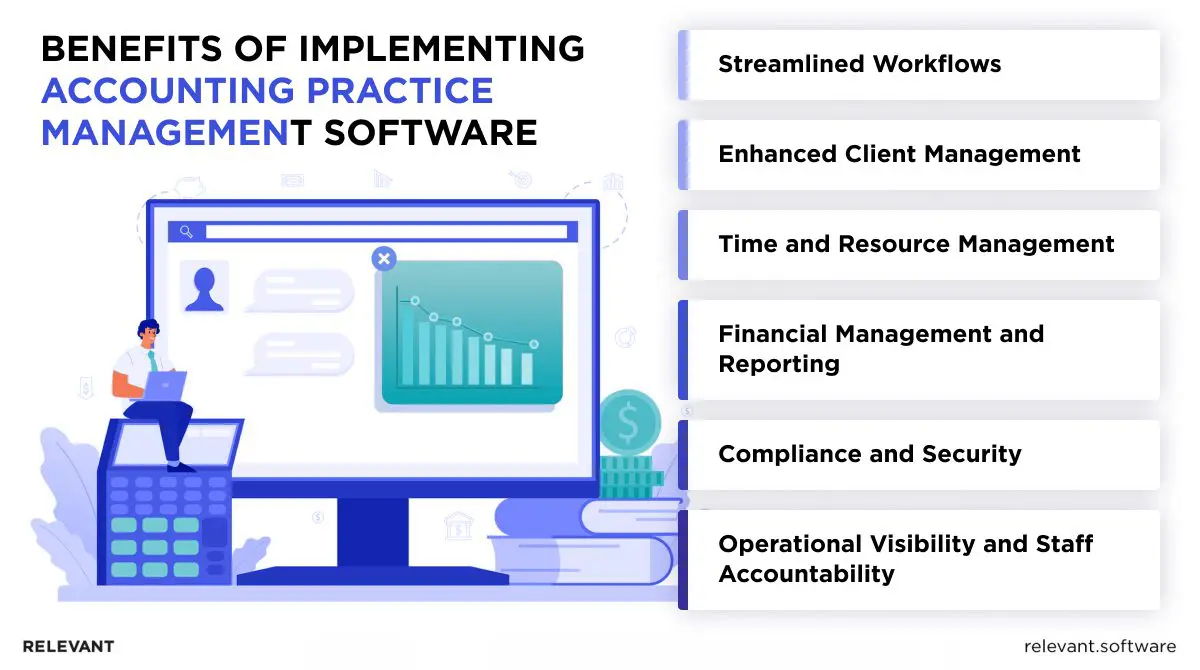Achieve More With Accounting Practice Management Software

Did you know the first known “accountant” was a 7,000-year-old clay tablet? Ancient Sumerians kept tabs long before Excel was even a twinkle in Bill Gates’ eye. Jump to the present, and accounting has become a maze of important tasks, clients, and deadlines that could overwhelm even the most experienced accountant. This is where accounting practice management software becomes relevant, making the firm’s operations far more manageable.
By integrating various functions into a single platform, accounting practice management software ensures that no task is forgotten, no deadline is missed, and no client is left waiting. To clear the air, we’ll explain how this software works and why custom software development quickly becomes every accountant firm owner’s new best friend.
from 25 countries outsourced software development to Relevant
We provide companies with senior tech talent and product development expertise to build world-class software.
What is Accounting Practice Management Software?
In the aftermath of COVID-19, the landscape of accounting firms has shifted significantly. Many small firms have embraced remote work and show little intention of returning to the office full-time.
This new work approach presents opportunities and challenges, especially in managing a firm’s operations effectively when the team is dispersed. Maintaining accountability and organization can struggle without the ability to check in on a colleague’s progress or ensure that everyone remains focused during work hours. The traditional methods of oversight and team collaboration no longer apply in a remote environment, making it difficult to keep track of projects, manage clients, and stay informed about the overall status of the firm. This is where specialized developments become essential.
But what is accounting practice management software? It is a solution that serves as a centralized platform to monitor the status of client work, collaborate with staff, and securely store client information—all remotely.
But wait! You must know that not all software designed for small accounting firms is equal. So, how can you pick the most suitable solution for your needs? Here are some essential functions that every accounting practice management software should be able to perform:

Client Management
Cloud-based accounting practice management software keeps all your client details—like contact information, addresses, and tax specifics—in one organized place. It also manages all communications, from emails to calls and appointments, ensuring that you stay on top of client engagements and never miss a deadline. With quick access to the client portal, communication history, and project status, online accounting practice management software can streamline interactions and address client needs promptly and personally.
Task Management
Task management features ensure that every task is clearly outlined, prioritized, and tracked by allowing you to assign tasks to team members, set clear deadlines and priorities, and track progress through to completion. This clarity in time management supports steady cash flow and reinforces client confidence in your firm’s fairness. Beyond the ability to track time, the software offers robust tools for resource management and workload balancing, which allow managers to assign tasks that align with team members’ skills and availability.
Time Tracking
Comprehensive time tracking systems allow for detailed time entries, billable vs. non-billable categorization, and integration with project management for seamless time allocation. They record the time spent on each client project and task, making it easy to generate timesheets and invoices. Plus, they assist with budget management and profitability analysis, so you can keep your firm running smoothly and efficiently.
Document Management
This feature ensures that all client documents—such as tax returns, financial statements, and contracts—are well-organized and secure. This means that only an authorized number of users can access these documents, which makes sharing and collaboration straightforward and safe.
Reporting and Analytics
Comprehensive reporting and analytics capabilities offer customizable reports on a firm’s performance, staff productivity, client profitability, and key performance indicators (KPIs). Some advanced solutions offer AI-powered document organization, with automatic categorization and tagging of files for easy retrieval.
Integration with Other Software
Seamless integration with other accounting and business applications is essential for optimizing overall efficiency. Compatibility with popular accounting software, tax firm’s preparation tools, CRM systems, and document management platforms ensures data consistency and reduces manual data entry. Many practice manager solutions offer mobile apps, allowing accountants to stay connected and productive on the go, promoting effective communication within the firm.
Types of Accounting Practice Management Software
Choosing the right accounting practice management software is like selecting the perfect tool for the job—each type offers unique advantages tailored to different needs. Here’s a table that compares the common types on the market:
| Type | Description | Pros | Cons |
| Cloud-Based Solutions | Hosted on external servers, accessible via the internet, with scalable resources and remote access. | – High flexibility with access anytime, anywhere – Reduced IT overhead with vendor-managed updates- Scalability to match firm growth and needs. | – Relies on stable internet connectivity- Ongoing subscription costs- Requires thorough evaluation of vendor security measures. |
| On-Premises Solutions | Deployed on local servers within the firm’s infrastructure, providing direct control over software and data. | – Full control over data security and compliance- Customizable to fit firm-specific internal processes and integrations- No reliance on external connectivity. | – Significant initial investment in hardware and IT infrastructure- Maintenance and updates require in-house IT expertise- Limited accessibility outside the office environment. |
| Specialized Software | Targeted tools designed for specific functions, such as client management, workflow automation, or document management. | – High degree of functionality and depth in specific areas- Allows for best-of-breed solutions tailored to particular firm needs.- Can offer a range of features not found in general workflow software. | – Potential for fragmented systems, requiring best practices for integration between multiple specialized tools- Increased complexity in managing multiple vendors and software licenses.- Higher overall cost if multiple specialized solutions are needed. |
| All-in-One Solutions | Comprehensive platforms bring together everything needed—workflow management, time tracking, and document organization—all in one workflow dashboard. | – Unified platform streamlines daily operations, reducing the need for multiple solutions.- Simplifies client data management with a single source of truth.- Enhances workflow efficiency with integrated features. | – May lack depth in specific areas compared to specialized tools.- Can be complex to implement and customize for firm-specific requirements.- Potential for a higher learning curve among users. |
Benefits of Implementing Accounting Practice Management Software
Running an accounting firm involves many complex parts—client relationships, deadlines, and countless tasks. The right tools, like cloud-based accounting practice management software, can make all of this easier to handle. Here are the benefits you can expect.

Streamlined Workflows
Accounting practice management solution shifts routine tasks to automated processes, handling activities like data entry, client data collection, invoice generation, and document management with speed and accuracy. This shift significantly reduces errors and frees up time for more pressing work. The tool also improves task delegation by clearly defining responsibilities, which ensures that tasks are assigned appropriately, progress is tracked properly, and deadlines are met without ambiguity.
Enhanced Client Management
Managing client relationships effectively is critical to the success of any accounting firm. With practice management software, all client information—from contact details to communication history—is consolidated into a single, easily accessible system. With all this information readily available, client communications become more efficient and personalized.
The software’s advanced CRM features offer deeper insights into client needs, allowing you to anticipate their requirements and deliver services that enhance the relationship. This approach improves customer satisfaction and encourages long-term loyalty.
Time and Resource Management
Time is a key factor in an accounting firm’s success, and how it’s managed can determine whether opportunities are seized or lost. The accounting practice management system tracks every minute spent on client work with precision, which ensures that billing reflects the true effort involved and prevents any financial discrepancies.
Additionally, it provides sophisticated tools for resource management and workload balancing, which allows managers to assign tasks in a way that maximizes team strengths and availability. Through more effective resource use, the tool promotes a productive work environment, mitigates burnout, and enhances client satisfaction.
Financial Management and Reporting
The financial integrity of an accounting firm rests on accurate invoices, prudent expense management, and comprehensive reporting. Practice management software underpins these processes by producing invoices that faithfully represent the time and resources allocated to client engagements. This ensures fair billing, timely payments, and a stable cash flow.
Furthermore, the practice management accounting software typically comes with financial reporting and analytics capabilities. It converts raw data into actionable, e.g., financial insights that help identify trends, manage expenses, and make strategic decisions to enhance firm profitability.
Compliance and Security
In the tightly regulated field of accounting, adherence to the latest laws and protection of sensitive data is critical. Practice management tools help firms stay on track with regulatory updates and guarantee that all required reports are properly generated and submitted.
The built-in security features, as well as encryption, access controls, and regular backups, protect client information. These robust measures ensure that data remains safe and compliant with legal standards.
Operational Visibility and Staff Accountability
Implementing accounting practice management software significantly enhances operational visibility and staff accountability within your firm. With real-time access to project statuses, task assignments, and employee performance metrics, management can quickly identify bottlenecks and address issues before they escalate. By centralizing tasks and responsibilities, everyone stays on the same page, deadlines are met, and operations run more efficiently.
Ready-made vs. Custom Software for Accounting Practice Management
Deciding between ready-made and custom software for your accounting practice requires an understanding of your firm’s specific needs. Each option offers distinct advantages and potential drawbacks, and the decision often comes down to weighing functionality, cost, and flexibility.
Option 1: Ready-made Software
Ready-made software, often referred to as off-the-shelf, is pre-built and designed to meet the needs of a broad range of accounting firms. This type is typically quicker to implement and comes with a wide range of features that are generally sufficient for most smaller firms. The benefits include lower initial costs, regular updates, and the support of a community of users. However, because it is designed for a wide audience, ready-made software might lack specific features or customization options that could be critical for your firm’s unique processes.
Option 2: Custom Software
Custom software is developed specifically for your firm to meet its exact requirements. It can offer unique features tailored to your firm’s particular needs and seamlessly integrate with existing solutions, potentially giving you a competitive advantage. However, this level of customization comes with higher upfront costs and a longer development timeline. Additionally, continuous maintenance and updates may require more resources, as the responsibility often falls on the firm rather than a software vendor.
Key Considerations
When choosing between ready-made and custom software for your accounting practice, it’s important to weigh the pros and cons carefully. The decision isn’t just about what works now but what will serve your firm best in the long run. For the best outcome, think about how your firm runs, what it specifically requires, and where you aim to take it.
- Complexity and Customization Needs: Evaluate how complex your firm’s operations are and how much customization is required. If your firm operates with standard processes, ready-made software might suffice. However, if your firm has specialized needs, custom solutions may be necessary to support unique workflows.
- Cost and Deployment Speed: Ready-made solutions generally come with lower upfront costs and quicker deployment times. These are often more suitable for firms looking for immediate implementation of practice management software accounting with minimal initial investment. For example, Xero Practice Manager offers a range of pricing plans, making it a flexible option for CPA firms looking to optimize their workflow.
- Specialized Needs and Differentiation: If your firm requires specific features or seeks to create a service offering that stands out from competitors, custom software offers the flexibility to meet these goals. Custom solutions can be tailored to fit your exact requirements, providing a competitive edge.
- Long-Term Implications: Consider the long-term costs associated with each option. Ready-made solutions may include ongoing subscription fees and potential functionality limitations. Custom software, while requiring a larger initial investment, may incur higher maintenance costs and demand dedicated resources for updates.
- Alignment with Strategic Goals: The decision between ready-made and custom solutions should be based on your firm’s overall strategy, operational needs, and budget. Choosing the right type of tool will enhance your firm’s efficiency, support growth, and ensure you remain competitive in the accounting industry.
Here’s a table comparing ready-made and custom accounting practice management software:
| Aspect | Ready-Made Software | Custom Software |
| Implementation Time | Quick to implement, typically available for immediate use. | Takes longer to develop, as it’s built to specific needs. |
| Cost | Generally lower upfront costs; subscription-based. | Higher initial investment, with costs tailored to development needs. |
| Customization | Limited customization; designed to meet general needs. | Fully customizable to match the specific requirements of your firm. |
| Scalability | Often scalable, but within the constraints of the software. | Highly scalable, designed to grow with your firm’s needs. |
| Integration | Pre-configured integrations with popular tools. | Custom integrations with any tools your firm uses. |
| Support and Maintenance | Vendor-provided support and regular updates. | Support and updates depend on the agreement with the developer. |
| Flexibility | Limited flexibility; must adapt to the software’s structure. | High flexibility, tailored to fit your existing processes and workflows. |
| Features | Comes with a standard set of features that cover most needs. | Features are designed specifically for your firm’s operations. |
| Time to ROI (Return on Investment) | Faster ROI due to immediate use, but may require compromises. | Longer ROI timeframe, but potentially higher long-term value. |
What Are the Costs of Implementing Accounting Firm Management Software?
The costs associated with an accounting practice management tool include initial purchase or subscription fees, along with development and implementation costs, often including training and setup. Additional expenses may arise from customization, maintenance, support, scale plan adjustments, and possible upgrade fees for newer versions or added features.
Build Custom Accounting Practice Management Software with Relevant
Building custom accounting practice management software requires a partner who understands your firm’s technical and operational needs. Relevant can be the one because we specialize in custom fintech software development services.
Let’s say you decide to hire us to develop a custom solution. Our approach begins with a business plan, and deep dive into your firm’s processes and challenges. We work closely with you to identify the specific features and tools that will make the biggest impact. Whether you need seamless integration with existing systems, advanced reporting capabilities, or intuitive user interfaces for your team, we design the product to fit your exact needs.
Choosing custom software development with Relevant means you gain a solution that evolves with your firm. We don’t just deliver a product; we build a partnership for years. Our team remains available for ongoing support, updates, and enhancements, ensuring that your software continues to meet your needs as your business grows.
Turning to Relevant for your custom software project is a step toward greater efficiency, better client management, and a stronger competitive edge. Let’s work together to create a tool that not only supports your firm today but also sets you up for future success. Contact us!


Hand-selected developers to fit your needs at scale! Let’s build a first-class custom product together.

